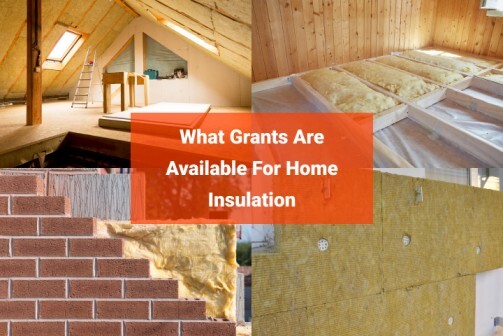Table of Contents
Insulating homes is the best way to stop heat loss in winters and save energy bills. However, when it comes to cost, nothing can set you aside except the insulation grants. Imagine, you are worried about how to pay a huge insulation cost that varies from £10,000 to over £20,000, depending on your home size. But suddenly, you came to know you can get it all for free!
Fascinating, right? Here, we will cover the available grant options that you can get for free home insulation. Not just that, you will explore how to get them to enjoy warm homes for a long time without breaking the bank.
Why Home Insulation Is Important
Home insulation is very important for many reasons. It helps keep your house warm during the cold winter months. This means you don’t have to use as much heating, which saves money on energy bills. In the summer, insulation keeps your house cool, so you don’t need to use fans or air conditioning as much. Insulation also helps reduce noise from outside, making your home quieter.
Moreover, it is good for the environment because it reduces the amount of energy needed to heat and cool your home. Using less energy means fewer carbon emissions, which helps combat climate change. So, insulation makes your home more comfortable, saves money, and helps the planet.
Types of Home Insulation
There are different types of home insulation:
- Cavity Wall Insulation: It is when insulating material is placed between the walls of your house. This helps keep heat inside during the winter and cool air inside during the summer.
- Loft Insulation: This involves adding a layer of insulation in the attic or loft space. This is one of the easiest and most effective ways to improve your home’s energy efficiency.
- Floor Insulation: This involves adding insulating materials under the floorboards. This helps keep the floor warm and prevents heat from escaping.
- Draught Proofing: It is about sealing gaps around windows, doors, and other openings to stop cold air from coming in and warm air from escaping. Each type of insulation has its own benefits and can help make your home more energy-efficient.
What Grants are Available for Home Insulation
The UK government provides grants to help homeowners insulate their homes. These grants make it easier to afford the necessary improvements. Two main schemes are available: the ECO4 Scheme and the Great British Insulation Scheme (GBIS). These schemes are designed to help different groups of people, especially those with low incomes or high energy bills.
By providing financial assistance, the government aims to make homes across the UK more energy-efficient. This not only helps individual households save money but also reduces the overall demand for energy. These schemes are a great way to improve your home’s insulation without bearing the full cost yourself.
ECO4 Scheme
The Energy Company Obligation (ECO4) Scheme is a program designed to help low-income households and those in fuel poverty. This means it targets people who struggle to pay their energy bills. Under this scheme, energy companies provide funding for various energy-saving improvements, including insulation. The main goal is to reduce energy consumption and make homes more energy-efficient.
- Eligibility:
- You must be a homeowner or a private tenant.
- You need to be receiving specific government benefits.
- Your home should have a low energy efficiency rating.
- How to Apply:
- Contact your energy supplier or a registered installer.
- Provide proof of eligibility, such as benefit statements.
- Arrange a home assessment to determine the insulation needs.
- Once approved, get the insulation installed by a certified professional.
Check Your GBIS Eligibilty!
Great British Insulation Scheme
The Great British Insulation Scheme aims to make homes across the UK more energy-efficient. This scheme offers grants for various types of insulation, including cavity wall insulation and loft insulation. It is designed to help homeowners and private tenants improve their homes’ energy efficiency.
- Eligibility:
- You must be a homeowner or a private tenant.
- You need to be part of a low-income household.
- Your home should have poor energy efficiency.
- How to Apply:
- Contact a government-approved installer who can fill out the application form with your details.
- Provide the necessary documents to prove your eligibility.
- Schedule an assessment of your home to determine the insulation needs.
- Once approved, get the insulation installed by a certified professional.
What Makes You Ineligible
You might be ineligible for these grants if any of the following happened:
- If you do not receive the required benefits, you may not qualify for the ECO4 Scheme.
- If your home already has adequate insulation, you might not be eligible for the grant.
- Homes with high energy efficiency ratings may also not qualify, as the schemes are designed to help those with poor energy efficiency.
- Tenants need permission from their landlords to make improvements, so without this permission, you may be ineligible.
What If a Homeowner Is Not on Benefits?
If you are not on benefits, you still apply for the insulation grants. Some schemes offer support for low-income households or those with poor energy efficiency, regardless of benefits. You can contact your local council to see if they have additional programs or advice on available support. There might be local or regional schemes that offer financial assistance for home insulation.
Additionally, some energy-efficient improvements may qualify for tax credits or rebates, which can help offset the cost. Even if you are not on benefits, there are still ways to make your home more energy-efficient and reduce your energy bills. It’s worth exploring all available options to find the best solution for your situation.
Conclusion
Home insulation is crucial for saving energy, reducing bills, and protecting the environment. The UK offers different types of home insulation grants available like the ECO4 Scheme and the GBIS to help homeowners insulate their homes. These grants cover important types of insulation like cavity wall and loft insulation.
By meeting the eligibility criteria and applying through the right channels, you can make your home more energy-efficient and comfortable. Even if you are not on benefits, there are still options available to help you improve your home’s insulation. Home insulation is a smart investment that pays off in many ways, making your home a better place to live while saving you money.
Frequently Asked Questions
You can get grants for various types of insulation, including cavity wall insulation and loft insulation. These are the most common types covered by the grants, but some schemes may also cover floor insulation and draught proofing
To qualify for the ECO4 Scheme, you need to be a homeowner or private tenant receiving specific benefits like Universal Credit, Pension Credit, or Child Benefit. Your home must also have a low energy efficiency rating.
Yes, tenants can apply for home insulation grants. However, you will need permission from your landlord to make any improvements to the property.
If your home already has some insulation, you may still qualify for additional insulation if the existing insulation is not adequate. An assessor will evaluate your home to determine if more insulation is needed.



